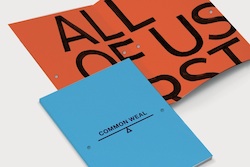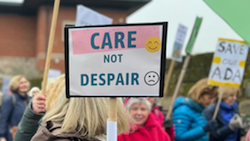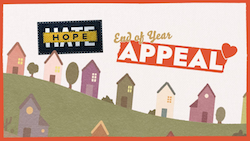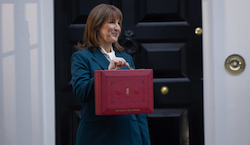BARRY WINTER reviews Common Weal, the new book from the Jimmy Reid Foundation, which sets out a vision for Scotland ‘run by its people, for its people’.
“Scotland’s people are in a unique position – we have been invited to imagine our nation afresh.”
So argues Robin McAlpine in the opening sentence of his interesting and unusual book, Common Weal. In doing so, he vividly displays the enthusiasm shown by many on the Scottish left – and beyond – for the opportunities presented by the referendum.
 Never mind the often boorish debates between the official Yes and No camps, still less the grotesque televised duels between Alex Salmond and Alistair Darling. Here are people talking about politics, about what really matters to them – and it has become infectious.
Never mind the often boorish debates between the official Yes and No camps, still less the grotesque televised duels between Alex Salmond and Alistair Darling. Here are people talking about politics, about what really matters to them – and it has become infectious.
As a letter to The Guardian puts it: “What is happening right now is that people all over Scotland are talking to each other about what is in the best interests of themselves, their children and their neighbours… The phenomenon is nothing short of sensational… In Scotland people are realising that democracy is not just an empty word, it is a state of mind – we can do this if we want to.”
Of course it is a debate that will have significant, indeed serious, consequences for Scotland and the rest of the UK. But then, that is what real politics is meant to be about.
Common Weal, meaning “wealth shared in common” and “for the well being of all”, says McAlpine, is published by the Jimmy Reid Foundation. It lucidly condenses into some 130 pages the work of 50 detailed policy reports produced for the foundation. These cover the economy, banking and taxation, poverty and inequality, work, trade, energy, welfare, and much more (and are available online). The policies advocated have been “tried and tested” elsewhere, we are told, particularly in the Nordic countries.
Never one to understate, McAlpine says: “This is arguably the biggest reimagining of a nation state in modern history.”
It certainly is impressive. For here is a message that is accessible, lively and challenging on how to reconstruct Scottish society on a just and equitable basis. Whatever one thinks about the referendum itself, the book provides a whole host of ideas in a style that sums up progressive thinking, while avoiding the jargon that many of us regularly use.
Thus, instead of talking about neo-liberalism and radical left alternatives, the author writes: “We’ve had 40 years of Me First politics – and we all came second. It’s time for a politics that puts All of Us First.” Common Weal roundly rejects what it sees as the prevailing survival-of-the-richest, winner-takes-all politics and mentalities that leave the majority of us disadvantaged.
Unbalanced Scotland
Where I am less convinced is when the book claims that it is “not meant to be a case for or against independence but only a case for a better Scotland”. This statement could be designed to appease any of the numerous contributors to the reports who support the union. But the general thrust of the whole work shows how, as it says, “our nation can be run by its people, for its people”. By nation, it means Scotland.
Pointing this out is not meant to devalue the policies being advocated which, in most respects, could usefully be expanded to include the rest of the UK. Indeed, much of its analysis fits with the ILP’s ideas about Unbalanced Britain.
On a rough count there are perhaps a dozen references in the book criticising the unbalanced nature of the economy, democracy, the corporate media, the environment, and working lives. The policies it calls for are designed to redress those imbalances, and they merit attention.
Elsewhere, McAlpine also argues: “Scotland’s economy is badly unbalanced: it does not create anything like enough good-quality jobs in large numbers because it is unproductive – we don’t make and create things. So we need to build a genuinely productive and innovative economy.” For him, this means ceasing to favour aggressive, low-paying multinationals and instead to create alternatives. Again, the same could be applied to the rest of the UK.
Central to his argument is the claim that a “better Scotland begins with democracy”. This, he affirms, means genuine, participatory democracy. He argues strongly in favour of putting power in the hands of local communities, as well as the need for a democratic media. He is critical of what he sees as the highly centralised nature of Scottish politics, in contrast to Finland, Norway, Sweden and even Germany. Scottish democracy is neither local nor democratic, he declares.
Opposing rule by so-called ‘experts’ at the centre, he says “we have to stop being afraid of different communities making different choices”. Fair point, but we also need to build in safeguards to ensure local communities show a care for all and do not become narrowly self-serving enclaves.
Common Weal does not attempt to offer a political strategy on how to secure the policies (which are at the most progressive wing of social democracy).
This can be found it in the more explicitly leftist book, Yes: The Radical Case for Scottish Independence, by James Foley and Pete Ramand (about which McAlpine has spoken favourably). While Yes has had many ringing endorsements, I find its arguments less persuasive.
However, Common Weal’s short ‘Epilogue’ acknowledges the need for the kind of politics than can deliver the changes it advocates. It calls for political parties that will take on vested interests and challenge the Me First narratives. It also recognises the need for lively, energised and empowered communities.
“Only then,” it concludes, “can we have a Scotland that really does put all of us first.”
As Michael Meacher wrote in The State We Need, turning the current situation round “requires both deep moral conviction and intense political determination to engineer a series of profound reforms in financial and corporate governance, the role of markets and the state, company ownership, remuneration systems and worker representation”. That’s a formidable challenge.
Tackling corporate elites and financial power lies at the heart of that struggle. Those with the power and the wealth will fight back. For me this spells ‘Better Together’ rather than separation – but that’s a debate that has almost run its course.
Britain: The facts
Common Weal points out that:
Britain has the second lowest level of industrial democracy among 28 European Union countries – only Lithuania is worse.
Among the 30 OECD countries, the UK is the 20th worst nation for health and safety at work.
British employees work among the longest hours in Europe and have the fewest holidays.
The average salary in Scotland is about £25,000; the average salary in Norway is about £45,000.
The average salary of the poorest tenth of the Scottish working population is about £6,500 compared with £25,000 for the poorest tenth in Norway.
The British state pension is now the lowest in the developed world.
Scotland, along with England and Wales, has one of the highest imprisonment rates in western Europe.
Inequalities in health have grown substantially during the last 30 years, higher in Scotland than in England and Wales.
In Britain we live in the smallest houses in Europe. We lack private space, we lack public space and we neglect the play needs of children.
The UK has some of the highest rail fares in Europe and transport costs generally are very high by international standards.
A recent World Health Organisation survey found that British children are the least happy in the world.
—-
Common Weal – Practical Idealism for Scotland, by Robin McAlpine, is available for £6 from the Jimmy Reid Foundation.
A short summary focusing on the Nordic countries is available to download here.
The author, Robin McAlpine, is director of the Jimmy Reid Foundation, editor of the Scottish Left Review and author of No Idea: Control, Liberation and the Social Imagination. More about the Jimmy Reid Foundation is here.
The website of the Common Weal project is here.
Yes: The Radical Case for Scottish Independence, by James Foley and Pete Ramand, is available for £10 from Pluto Books.
See also:
‘Scotland’s Referendum: Why the Left Should Oppose Independence’, by Will Brown
‘No Short Cuts to a Progressive Scotland’, by Vince Mills
‘Want to Escape Austerity? Move to Scotland’, by Ernie Jacques.



2 October 2014
[…] according to Harris – might be something the left in the UK as a whole could draw strength from. Barry Winter has noted how one of the great positives of the Common Weal project is it’s ability to speak in a new, more […]
19 September 2014
Labour needs to learn immediately from the Scottish Referendum. Especially from 97% electoral registration and an 85% turnout, including a keen response from young voters. That should tell us that given clear and important alternatives in politics, the bulk of the people can and will respond. With the Labour Party Conference starting in two days time, it has the chance to show a clear and progressive case that it intends to put before the UK electorate for the coming General Election. If Ed and company will only grab this opportunity, then we can start to change the face of British politics. If !
16 September 2014
Ernie. Scotland is not being asked to vote for Ed Miilband, 100 tame Labour MPs, UKIP, the banks, the multi-nationals, ASDA, John Lewis, the Orange Order, Obama, Tony Abbott, Henry Kissinger, Pinocchio, Gordon Brown, Lord Prescott, Thatcher, Major, Deutsche Bank, John Hannet, New Labour, Sir Michael Phillip, Mick Jagger, Sir Richard Charles, Nicholas Branson, Sir Bruce Forsyth-Johnson, Cameron, Clegg, Farage, nor any other people or bodies who recommend “no”. So it is not worthwhile for anyone to refute what you say by producing a list of alternative wasters who advocate a ‘yes’ vote.
Hopefully those with a vote will do more than take a punt; but will reflect carefully upon questions over matters such as nationhood, constitutional transformation, economic adjustment, how to respond to changes proposed by both the “yes” and “no” camps and the nature of the subsequent period of readjustment after the referendum -, plus subsequent relations with the outside world. When we know the result on Friday, then we need to try to start an even bigger debate on “what now?”.
One positive thing we need to learn from the referendum, is that given a good turnout it will have been possible to tackle problems of voter engagement. Nowhere is this more important than amomgst young voters.
13 September 2014
Barry,
Trying to look afresh at Scottish Independence debate objectively – and “pigs might fly” some might say – well a least as objectively Ed Miliband and his 100 Westminster MP’s who marched up to Scotland yesterday to join the Tories, UKIP, banks, multi-nationals, ASDA, John Lewis, Orange Order, along with any number of non-dom celebrities (happy to collect their lucre and gongs in the UK but live abroad and take advantage of tax-havens) all making an impassioned plea on behalf of the union. (BUT NOT THE UNITE UNION)
Yesterday saw a virtual tsunami of the great and the good (the winners not losers) all shouting from the same hymn sheet, “We’re Better Together”. We’ve even had world leaders such as Obama, Tony Abbott and war criminal, Henry Kissinger, weighing-in on behalf of the union.
And sadly (from my perspective) it’s working insofar as opinion polls seem to favour the no camp again.
Our own Ed Miliband, speaking to an invited audience of Labour loyalists (and TV cameras) gave a master class in political spin and Pinocchio like objectivity by informing us it’s really a head, heart and soul thing: “Head: because I believe we can better create a more equal, a more socially just society together than we can alone. Heart: because of the ties that bind us together and would be irreversibly broken by separation.
And soul: because it is solidarity that built the great institutions like our National Health Service and can tackle the great injustices of our time.”
It was all bit melodramatic and hammy but other might think it was moving and tearful until he went in hyperbole mode claiming a no vote was a vote for a fair society and that: “Independence doesn’t drive you towards social justice, it drives you away from social justice.” And you know what, he might even believe it?
Our Ed was joined also by big hitters Gordon Brown and Lord Prescott (yes, he who all his working life raged against the undemocratic House of Lords and promised to abolish it) making passionate pleas to vote No in defence of our NHS and Labour movement values (sic). Again some might believe this soap box solidarity sob-story had they ever been near a strikers’ picket line or unambiguously supported working people fighting desperately to save their jobs, conditions of employment and trying escape from the dole, social exclusion and Gordon’s much trumpeted and hugely expensive (work-for-nothing) work-fare schemes.
These are the same Labour leaders who unashamedly promoted PFI and the privatisation agenda, the outsourcing of public sector work and jobs, who lauded the city, light touch regulation, risk takers and venture capitalists, city slickers, and all those who’s overarching greed brought about the world-wide financial crisis and austerity to millions of working people who they claim so earnestly to support and represent.
Labour leaders who after 13 years in government and after promising that things can-only-get-better left a legacy of income inequality at a post-war high. Managing to trump the Thatcher and Major years was some achievement and no amount of political spin, collective amnesia or buggins’-turn optimism will change that.
So, in the context of the Scottish independence debate the only solidarity I have noticed from Ed and his wannabe cabinet ministers is with Cameron, Clegg, Farage, the head of Deutsche Bank and myriad capitalist cheer leaders, in addition to working class luminaries such as Sir Michael Philip, Mick Jagger, Sir Richard Charles Nicholas Branson, and Sir Bruce Joseph Forsyth-Johnson, et al.
Deserting a sinking ship
But could it be that Ed Miliband’s panic, near apoplexy and appeals to Labour history and solidarity might just have something to do with polling figures suggesting a third of Labour voters (yes, voters) have deserted to the Yes camp. Or is that just EJ thinking aloud in lightweight, cynical and mischief-making mode?
But if these polling figure are bad, what are we to make of a recent poll in Kirkcaldy, Fife, the constituency of Gordon Brown who garnered 60% of the votes at the last general election, but where support for independence puts the Don’t Knows at 22%, the No camp at 24% and Yes vote at 54%? With Don’t Knows excluded it suggests a near 70%/30% spilt in favour of independence in an overwhelmingly working class constituency. Could that be the reason for Gordon’s sudden rehabilitation, rejuvenation and apparent rise from the dead?
And as a life-long trade unionist what are we to make of a brief Referendum letter sent to all Usdaw members in Scotland (under the name of general secretary John Hannet) who said: “Don’t let others decide what is best for you… If you don’t know – then you should vote NO.”
But there again, while there will be more than a few nutty eccentrics in the Yes camp and we can debate (as Barry says) which side is best placed to deliver change and social justice it should be acknowledged that the figures cited in ‘Britain: The Facts’ is a damming incitement of 35 years of uninterrupted neo-liberalism which include 13 years of New Labour rule. And that for me suggests why huge numbers of Labour Party members and traditional voters are deserting in droves and are willing to take a chance on independence in the hope that things might really get better.
A day return train ticket to Glasgow or Edinburgh and back, and a few crocodile tears and the statements by Ed Miliband saying: “I agree. I get it. There needs to be this change”, is not much of an apology, and doesn’t cut the mustard in terms of a credible and believable economic strategy.
And without a strategy for change, the people of Scotland and UK know what a Westminster parliament will deliver, be it Cameron, Johnson, Clegg or Miliband (or any combination or coalition of these political luminaries) in-so-far as we have it already. It’s austerity, unbalance, unfairness and social exclusion, by the bucket load.
Faced with that lean gruel, who can blame the Scottish people if they take a punt and vote YES on Referendum day?